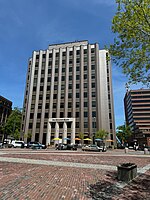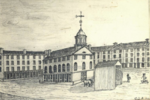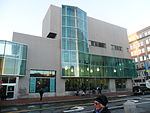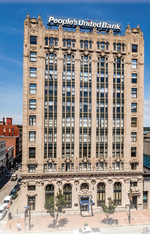Byron Greenough Block
Commercial buildings completed in 1848Commercial buildings in Portland, MaineCommercial buildings on the National Register of Historic Places in MaineGreek Revival architecture in MaineNational Register of Historic Places in Portland, Maine

The Byron Greenough Block or Lower H. H. Hay Block is an historic commercial building at Free and Cross Streets in downtown Portland, Maine. Built in 1848 and enlarged in 1919 to a design by John Calvin Stevens, it is one of the city's finer surviving Greek Revival commercial buildings. The block was listed on the National Register of Historic Places in March 1977.
Excerpt from the Wikipedia article Byron Greenough Block (License: CC BY-SA 3.0, Authors, Images).Byron Greenough Block
Monument Way, Portland
Geographical coordinates (GPS) Address Nearby Places Show on map
Geographical coordinates (GPS)
| Latitude | Longitude |
|---|---|
| N 43.656944444444 ° | E -70.257777777778 ° |
Address
Monument Way 1
04101 Portland
Maine, United States
Open on Google Maps








